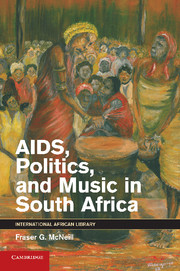Book contents
- Frontmatter
- Contents
- Maps
- Preface
- Acknowledgements
- Abbreviations
- Select Glossary of Tshivenda Terms in the Text
- Maps
- 1 Introduction
- 2 The Battle for Venda Kingship
- 3 A Rite to AIDS Education? Venda Girls’ Initiation, HIV Prevention, and the Politics of Knowledge
- 4 ‘We Want a Job in the Government’
- 5 ‘We Sing about What We Cannot Talk About’
- 6 Guitar Songs and Sexy Women
- 7 ‘Condoms Cause AIDS’
- 8 Conclusion
- Appendix A: Songs on Accompanying Web Site
- Appendix B: ‘Zwidzumbe’ (Secrets)
- Appendix C: AIDS, AIDS, AIDS
- References
- Index
4 - ‘We Want a Job in the Government’
Motivation and Mobility in HIV/AIDS Peer Education
Published online by Cambridge University Press: 05 November 2011
- Frontmatter
- Contents
- Maps
- Preface
- Acknowledgements
- Abbreviations
- Select Glossary of Tshivenda Terms in the Text
- Maps
- 1 Introduction
- 2 The Battle for Venda Kingship
- 3 A Rite to AIDS Education? Venda Girls’ Initiation, HIV Prevention, and the Politics of Knowledge
- 4 ‘We Want a Job in the Government’
- 5 ‘We Sing about What We Cannot Talk About’
- 6 Guitar Songs and Sexy Women
- 7 ‘Condoms Cause AIDS’
- 8 Conclusion
- Appendix A: Songs on Accompanying Web Site
- Appendix B: ‘Zwidzumbe’ (Secrets)
- Appendix C: AIDS, AIDS, AIDS
- References
- Index
Summary
The eighth birthday party of the Ha-Rabali HIV/AIDS peer education project was well under way as I crept into the large tent through the back entrance. Some volunteers squeezed up on the benches to give me a seat, and I got out my notebook and pen to make a record of proceedings. The tent was full of young women dressed in their best finery of colourful minwenda cloth, and, as usual, I felt completely underdressed. It was unbearably hot, and the photocopied order of proceedings was being used by guests as a makeshift fan. At the top table, the project coordinator sat in a line of distinguished dignitaries including the local traditional leader, the ANC ward councillor, a pastor, the director of a local NGO, and a policewoman. In due course, they rose to give lengthy contributions concerning the work of the project, pausing occasionally to sip water and wipe sweat from their brows. They were met with polite applause from the crowd. A car drew up outside and four women in very expensive minwenda dresses and headscarves walked into the front of the tent, accompanied by ululations that drowned out the policewoman's speech. I recognised them as peer educators from the very start of the project in 1998, whom I had not seen for years. They were now working for the government, in the Department of Public Works, as AIDS counsellors and trainers. When the dignitaries had completed their speeches, the four ex-educators rose to give a brief presentation – more like a motivational speech – on their humble beginnings and their new-found status. As they received rapturous applause at the end of their contribution, a current volunteer leaned over to me and pointed at my notebook. ‘Write this down’, she said. ‘These women are the real peer educators.’
Over the past decade, most people in Venda have been exposed to biomedical ideas about AIDS through voluntary, exclusively female, peer group education. In this chapter, I begin a critical evaluation of these peer education projects based on an analysis of the contradictions between the intentions of project designers, on the one hand, and the motivational incentives of peer educators on the other. Subsequent chapters build on this: developing the analysis to consider the ways in which volunteers use music in an attempt to transfer biomedical knowledge; showing that volunteer efforts are at best partially successful and at worst counterproductive; and then arguing that the very process of peer education frames the volunteers – and condoms as their most widely recognised symbol of prevention – as vectors of the virus. The overall picture that emerges is an unsettling one. HIV/AIDS peer education has become part of the problem, as opposed to part of the solution.
- Type
- Chapter
- Information
- AIDS, Politics, and Music in South Africa , pp. 114 - 153Publisher: Cambridge University PressPrint publication year: 2011



